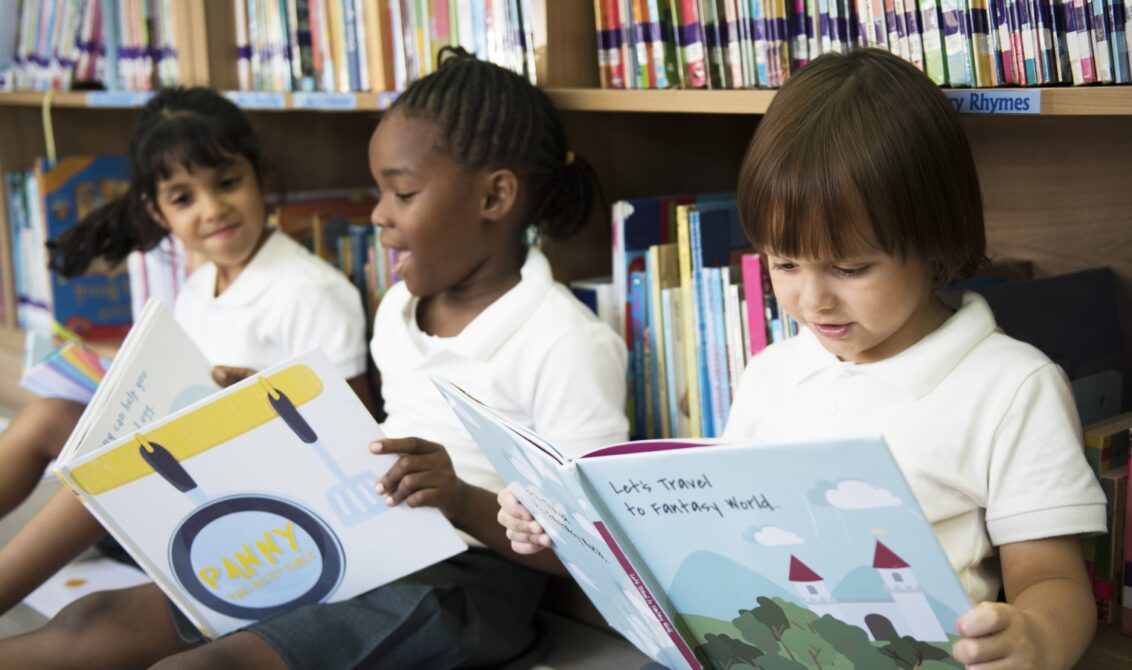
This academic year started a whole new chapter for schools but how can we better promote a healthy reading culture? Storyteller and educational trainer, Alec Williams shares his top tips for building your school reading culture to inspire every child to become a reader.
‘If I visited your school’, I often ask teachers and school librarians, ‘would I know that it’s a school that values reading… before I got to the library?’ (This assumes the library’s lively, well-stocked, welcoming, and used). ‘Would I see photographs of a recent author visit on your entrance area’s computer screen? Would I see, at child’s-eye level in the corridors, jumbled book titles, ‘children’s picks’, and author bios? Are there poems in unusual places, like the back of toilet cubicle doors?
Yes, it’s certainly possible to see signs of a reading culture, but you can use other senses too. If I asked a child what book they’d last read or heard – or if I stopped a teacher with the same question – would I get a good answer? I hope you’d also be able to hear class teachers reading aloud (maybe serialising books, a chapter a day), along with hearing book recommendations from staff and children at assembly time. There’s also, to borrow from Paul Simon, ‘the sound of silence’, as children and their class teacher all read their books together in DEAR, ERIC, STAR, or other acronymed reading times.
Finally, there’s that sixth sense – an intangible atmosphere about the place. ‘The animation of the kids… the sense of intellectual life in the corridors’, as author Anthony Horowitz put it. What keeps me enthusing about reading has something of the same intangible quality; personally I don’t need reports, surveys and yet more evidence, it’s a feeling in my gut, borne of being encouraged as a child, being a reader myself, and still discovering great children’s fiction today (most recently Sophie Anderson’s The Girl who speaks Bear and M G Leonard’s The Highland Falcon Thief), that keeps me proselytising to teachers and ‘waving and raving’ books to young audiences. A reading culture is not just seen and heard, but felt.
The whole school – everywhere and everyone
You’ll notice I used the full phrase in this blog’s title – a ‘whole-school’ reading culture. Everyone should be involved; it can’t be ‘Mrs Jones versus the others’, or ‘yes, Key Stage 1 are good at that’. If you’re appointing a ‘Reading Champion’, make sure that those ‘others’ don’t ease off and leave it to the champ. We all need to be reading champions!
Also, it’s so easy to say ‘our school provides a reading culture’. Your website might say that (it probably says you’re passionate about it!), but don’t commit the politician’s sin of over-promising and under-delivering. Make it real: part of the school development plan, with the Head’s support, and parent/governor involvement. And make it wide: TAs, school meals staff, caretakers – any of them can remember a favourite book, recommend a book, and talk about what they’re reading to a child or grandchild. And that’s even before we get to guests…
Today we have a very special visitor…
Your school’s reading culture may be more on show some days than others – and I don’t mean simply before visits by inspectors, government officials or other ordeals! A well-planned and followed-up school visit, by an author, illustrator, storyteller or other ‘book world guest’ can make a huge impact on children – and on the staff who are listening in, too. Your local library service should know of authors who’ve visited your area, or colleagues and friends might be able to recommend people. You can often approach potential guests directly, through their websites, or you could try author agencies: Authors Aloud UK is just one example, and there are several more.
Balance these visits by guests from the local community: a firefighter, a local councillor, a parent, a local sportsperson. Children would expect an author to say “reading’s great!”, but when this message is repeated by ‘ordinary citizens’, they’ll realise that there’s a whole community out there who enjoy reading; that it’s not something that just their teachers tell them.
A library with classrooms around it
Having worked in libraries for around 120 years (remember I’m also a storyteller, so I may exaggerate), you’d expect me to mention school libraries. My definition of a school is ‘a library with classrooms round it’, and there’ll be a blog entry in future about libraries, never fear! In the meantime, here are a few well-chosen words, and some questions:
- Is your classroom book collection in good shape and inviting, or muddled and unloved?
- Is it propped up by your own book purchases?
- Hands up if your school library’s a bit moribund and ignored (then put it right)
- Bringing books together saves money, shows the need for order, and breeds library-savvy children
- Children may learn to read in the classroom, but in the school library they learn to be readers.
Readers are made by readers
Although you’ll see mentions of role models earlier in this piece, I want to reinforce it at the end because it’s arguably the most important point to make. I appreciate that not every teacher has the time or inclination to be a voracious reader, but find out who the book fans are, and try to achieve a critical mass of teachers who’ll inspire children to read by talking about their own reading and asking them about theirs. There’ll be teachers who have out-of-school interests with reading attached, and you may discover closet science fiction fans, or other genre buffs, who can pass on their obsession to a new generation. In author Geraldine McCaughrean’s succinct words: ‘Be seen reading. If you don’t, they won’t’.
I’m convinced – where else do I look?
This article has included some of my guiding principles and favourite ideas, but there are many more in the freely-downloadable Get Everyone Reading, which I wrote for the School Library Association. Let me also pay credit to some other people whose ideas you ought to look at. Writer Michael Rosen’s 20-point plan for Reading for Pleasure piece, for instance, or Norfolk teacher Jon Biddle’s hilarious but provoking mirror-image piece, 23 ways to create a non-reading school. Get Everyone Reading also lists some key books, websites, and social media sources of ideas. If you’re lucky enough to have a school library service, start there first.
And in between your reading, try a ‘visual audit’ of your school, looking for what your own reading culture looks like. Then improve it. Good luck!
Talking point: enthuse more than you use
Throughout the history of children’s books there have been educators who’ve used fiction for teaching or social purposes (and authors who’ve written books, sometimes with this in mind). We’re currently in an age where fiction’s social benefits are much touted: of course books can help with wellbeing and mental health; of course they can develop empathy, promote and demonstrate diversity, and so on; these are positive benefits that children will get from either a few spotlighted books, or (more subtly) from a generous and wide reading diet anyway.
But if fewer children are reading for pleasure, those spotlighted books will loom larger in their reading diet, maybe occupying most of it, and the wider landscape of unalloyed, ‘message-free’, read-what-you-like fiction may get diluted. The books that are most likely to create readers beyond school – adventure, funny, scary, sport and animal stories; non-fiction too – if promoted with zeal by knowledgeable teachers and librarians, will develop a real habit of reading. And it’s the memory of those reading experiences (and those adult role models) that will create adult readers. Other than one-to-one occasions, use any ‘prescription fiction’ approach sensitively, whilst enthusing even more about the sheer escapism and fun of all those authors and series – yes, even the ‘cheap and cheerful’ ones – that hopefully line your school library and classroom shelves.
Alec Williams is a speaker, trainer and storyteller.
More information on Alec can be found at: www.alecwilliams.co.uk
Further reading
Explore our English and Literacy resources for International schools.
This blog post was originally posted on the Pearson UK Schools website
Sign up to receive our blog updates
Like what you read and want to receive more articles like this direct to your inbox? Subscribe to our blog and we’ll send you a fortnightly digest of the blog posts you may have missed, plus links to free resources to support your teaching and learning.

